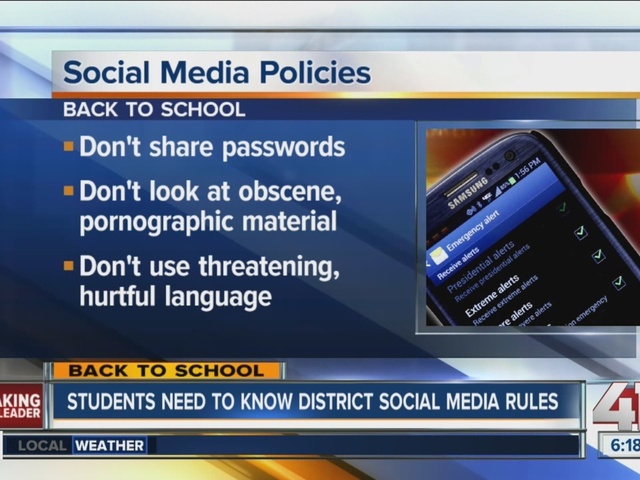With more school districts in the Kansas City area giving students devices to use for class, it’s important for students and parents to know their school district’s electronic use and social media policies.
We asked several school districts for their policies and discovered many are similar.
Every district prohibits teachers and students from viewing obscene, sexually-explicit or pornographic materials. Students are also prohibited from using harassing, hurtful or threatening language. Policies also address passwords, warning students to never share their passwords or account information.
“We will be working with our students to encourage them to be good digital citizens and to know how to be safe online and we want parents to be confident about what they should be looking for as well,” said Leigh Ann Neal, spokesperson for the Shawnee Mission School District.
Shawnee Mission is giving all high school students a MacBook Air laptop. Middle school students are receiving iPad Airs and 10 elementary schools will phase in iPads for each student to use at school.
The district will hold training courses for students and parents so they know the expectations with these devices.
You can learn about your school’s policy by visiting their website.
Detective John Stirling said online safety starts with the parents. Parents need to have conversations with their children about how to protect themselves when they’re logged on.
“I would recommend they have the conversation of, 'We're concerned for your safety. It is an unfortunate situation that we have people in this world who are there to perpetrate on kids and we don't want you to get hurt. We don't want you to get in a bad situation either on purpose or unknowingly,’” said Stirling.
He emphasizes that parents need to tell their children that not everyone is who they appear to be online.
“Kids will sit there and tell you, ‘This is a good friend of mine, I know him,’” Stirling said. “’Well, how do you know him? Because you talked to him for two months on Kik? You don't really know the guy. He could be telling you he's anybody.’”
Other points, Stirling recommends, include the digital footprint. He said you want to ensure your children understand that anything posted online is permanent. Even on apps like Snap Chat, where your photos supposedly disappear, Stirling said there’s a code and that photo is out there online somewhere.
Also, if your child posts a picture online, it can come back to haunt them later. Inappropriate photos can end up on websites around the world and there’s very little Stirling and other investigators can do to get them down. Stirling said your child is likely not thinking about the future and how these images could hurt their chances for employment when they become adults.
Finally, there could be legal ramifications for what your children post online. While Kansas doesn’t have a specific cyber bullying statute, other statutes can be applied in cases of bullying, threats or blackmail.
And certain posts can also break federal laws.
“By federal statute, any photo of a child, under the age of 18, in any state of undress is child pornography,” said Stirling. “It doesn't define who possesses it, who took it, who sent it.”
Stirling said every child is different so each parent’s approach may be different. But it’s essential to have the conversation.



